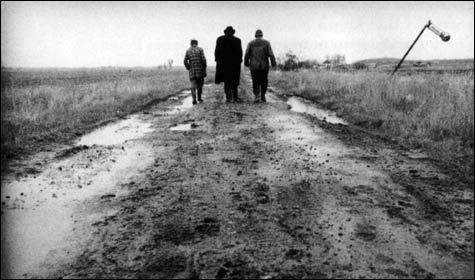The lingering gaze of Béla Tarr at the HFA
By MICHAEL ATKINSON | January 10, 2007

SÁTÁNTANGÓ: A single, harrowing, ass-in-seat experience. |
Let’s take stock of Béla Tarr, the great Hungarian dyspeptic, and maybe the most famous and revered international film titan to have been so pitifully screened in American theaters that his public profile here is tantamount to an embargo. One of the planet’s great cinematic formalists and, with Theo Angelopoulos and Aleksandr Sokurov, one of the reigning masters of the immersive, hyperextended tracking shot, Tarr has a wedge of territory all to himself — apocalyptically run-down, dead-or-dying post-Communist villages on vast Mittel European plains of mud, poverty, crushed will, delusionary behavior, and charcoal skies, all observed by a cinematographic point of view that stalks silently and patiently through the ruins like a ghost. To label Tarr, co-subject of this week’s micro-retro at the Harvard Film Archive, as a downer is merely a philistine’s impatient way of saying he’s an existentialist, a modern-film Dostoyevsky-Beckett with a distinctly Hungarian taste for suicidal depression, morose self-amusement, and bile.In this he’s not sui generis, but his mise-en-scène — his capacity to limn out entire environments in long one-shot sequences that encompass breathtaking coincidence and natural phenomena without seeming gimmicky or over-planned — is moviemaking at its bravest and movie watching at its most galvanizing. Looking over the development of post-Antonioni film culture, you could see shot length in itself as a kind of cultural palmistry: American filmmakers favor control-crazy brevity, but for a certain breed of cinéaste in Western Europe, where memory of the past weighs on life like cloud cover, the syntax of the real-time, spatially expressive tracking sequence is the way movie time should be constructed. For Russian wonder Mikhail Kalatozov, the whole world captured in a single motion meant our righteous empathies had nowhere else to look; for Tarr precursor Miklós Jancsó, breadth and length were ways to understand the canvas of war. Andrei Tarkovsky’s moody set-ups were metaphysical questions, growing less answerable the longer they became. Greek master Angelopoulos’s stock-in-trade mega-shot is a translation of history into visual experience.
Tarr is the only notable director for whom the giant one-shot scene is a turning inward, a dance between philosophical pessimism and the desperate actualities of life that press down upon it. It wasn’t always so: he began as a hard-bitten, post-Cassavetes realist, working in the mid-’70s subgenre known in Budapest as “documentary fiction.” He began to experiment with long takes and distance in 1982, with a TV version of Macbeth; his previous three features, all out on DVD from Facets, are a different species altogether, intimate, urban, desultory, and inflamed with class rage. Family Nest (1977), a spiteful, multi-generational drama of life on the dole, was the film Tarr made before he went to film school; The Outsider (1981) traces the aimless social descent of an off-the-grid violinist more concerned with boozing than with holding a job. Prefab People (1982) is an unrelenting, smell-the-sour-breath portrait of a blue-collar marriage dissolving under pressure from Communist-era poverty, masculine inadequacy, and restless depression.
 Related
Related:
Once upon a time in Hungary, Review: The Man From London, Wish-fulfillment for a burning world, More 
- Once upon a time in Hungary
Since its release in 1994, Hungarian auteur Béla Tarr’s 435-minute sui generis masterpiece Sátántangó has had the top critics grasping for superlatives.
- Review: The Man From London
I had to wonder whether this latest film from Béla Tarr (co-directed by Ágnes Hranitzky) is a self-parody.
- Wish-fulfillment for a burning world
From the shining big-screen debut of Iron Man to the large amounts of green produced by the Incredible Hulk, this was the year the public couldn't get enough of their favorite heroes.
- Cinema of suffering
Film, like most arts, tries to turn misery into entertainment.
- Fallen
Drain Blow-Up of its psychedelic hues and manic outbursts and you’re imagining Fred Kelemen’s darker-than-noir existential mystery.
- Kino pravda
Because Mosfilm, the subject of the Museum of Fine Arts’ “Envisioning Russia” retrospective, was the Soviet state production studio, any cross-section of its history lays out the entirety of Soviet film history.
- Doing time
It's not so much about killing as it is about time. Horror scope: Robert Graysmith’s Zodiac obsession. By Peter Keough
- Tilda Swinton's mixed metamorphoses
Most people know Tilda Swinton either from her role as the White Witch in the Narnia movies or as the striking-looking woman who in her speech accepting the Best Supporting Actress Oscar for her performance in Michael Clayton said she was going to give the trophy to her agent. Or perhaps as the actress whom Conan O'Brian said he would like to portray him if there's ever an HBO movie made about his life.
- Less

 Topics
Topics:
Features
, Jacques Rivette, Andrei Tarkovsky, Theo Angelopoulos, More  , Jacques Rivette, Andrei Tarkovsky, Theo Angelopoulos, Bela Tarr, Laszlo Krasznahorkai, Alexander Sokurov, Mikhail Kalatozov, Less
, Jacques Rivette, Andrei Tarkovsky, Theo Angelopoulos, Bela Tarr, Laszlo Krasznahorkai, Alexander Sokurov, Mikhail Kalatozov, Less 